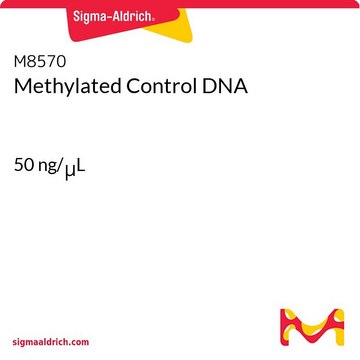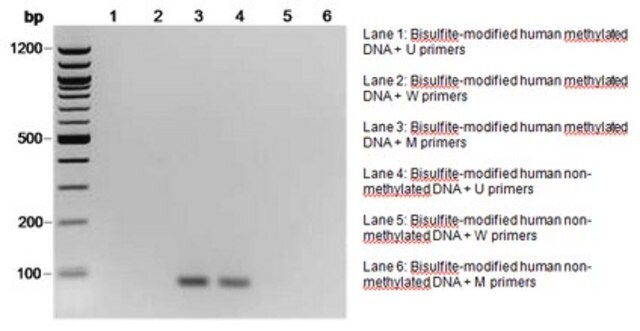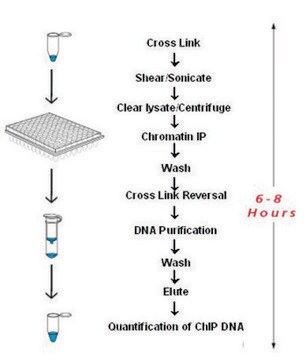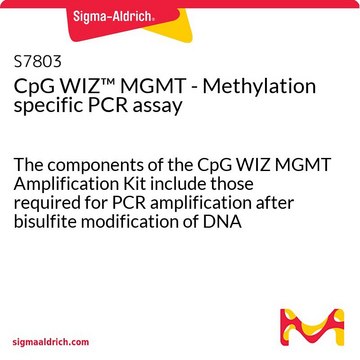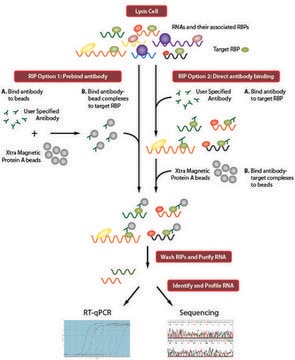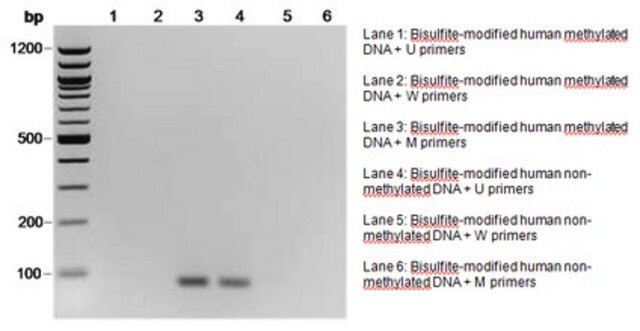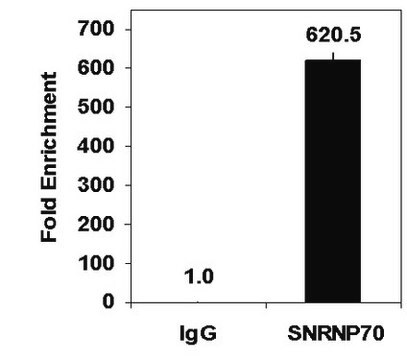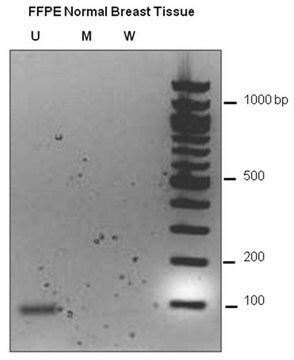S7847
CpGenome Turbo Bisulfite Modification Kit
The CpGenome Turbo Bisulfite Modification Kit is designed to simplify & streamline the bisulfite modification process. In just 90 minutes go from DNA sample to bisulfite converted DNA ready for analysis.
About This Item
Recommended Products
Quality Level
manufacturer/tradename
Chemicon®
CpGenome
application(s)
genomic analysis
shipped in
ambient
Related Categories
General description
Several methods have been developed to determine the methylation status of cytosine. These include the use of antibodies or protein methyl binding domains, digestion with methylation sensitive, insensitive, or dependent restriction enzymes as in restriction landmark genomic scanning (RLGS), oligonucleotide array hybridization, bisulfite genomic DNA sequencing and Methylation Specific PCR (MSP).
Genomic DNA sequencing, although time consuming and labor intensive, offers a more universal detection method. MSP is an established technology for the monitoring of abnormal gene methylation in selected gene sequences. Utilizing small amounts of DNA, this procedure offers sensitive and specific detection of 5-methylcytosine in promoters. It is being exploited to define tumor suppressor gene function, and to provide a new strategy for early tumor detection by interrogating DNA derived from tissues and bodily fluids.
The initial step of both bisulfite genomic sequencing and MSP is to perform a bisulfite modification of the DNA sample. In the bisulfite reaction, all unmethylated cytosines are deaminated and sulfonated, converting them to uracils, while 5-methylcytosines remain unaltered. Thus, the sequence of the treated DNA will differ depending on whether the DNA is originally methylated or unmethylated. Also, the initially complementary DNA strands will no longer be complementary after cytosine conversion. Primers for use in MSP can be designed to specifically amplify either a bisulfite-sensitive, unmethylated strand or a bisulfite-resistant, methylated strand, based upon these chemically-induced differences. Millipore offers a selection of CpG Wiz MSP kits to enable gene-specific analysis by MSP. To learn more about CpG Wiz kits and MSP technology Click here
Key Features
- Input sample to modified DNA in 90 minutes
- Conversion efficiencies of 99.9%
- Effective with as little as 1 ng input DNA
- Recover modified DNA in as little as 25 microliters
- Proven performance in multiple downstream applications
Application
Epigenetics & Nuclear Function
Components
Bisulfite Conversion Reagent 2
Bisulfite Reagent Diluent
DNA Binding Buffer
Wash Buffer NT3 (Concentrate)*
Elution Buffer NE
Modified DNA Purification Columns
2 mL Collection Tubes
*DNA Wash Buffer requires the addition of 100% Ethanol
Legal Information
Disclaimer
Signal Word
Danger
Hazard Statements
Precautionary Statements
Hazard Classifications
Acute Tox. 4 Inhalation - Acute Tox. 4 Oral - Aquatic Chronic 3 - Eye Dam. 1 - Met. Corr. 1 - Skin Corr. 1C
Supplementary Hazards
Storage Class Code
8A - Combustible corrosive hazardous materials
Regulatory Listings
Regulatory Listings are mainly provided for chemical products. Only limited information can be provided here for non-chemical products. No entry means none of the components are listed. It is the user’s obligation to ensure the safe and legal use of the product.
JAN Code
S7847:
Certificates of Analysis (COA)
Search for Certificates of Analysis (COA) by entering the products Lot/Batch Number. Lot and Batch Numbers can be found on a product’s label following the words ‘Lot’ or ‘Batch’.
Already Own This Product?
Find documentation for the products that you have recently purchased in the Document Library.
Our team of scientists has experience in all areas of research including Life Science, Material Science, Chemical Synthesis, Chromatography, Analytical and many others.
Contact Technical Service
